英语专业毕业论文--谈中学生英语自主学习能力的培养
中学生英语自主学习能力的培养
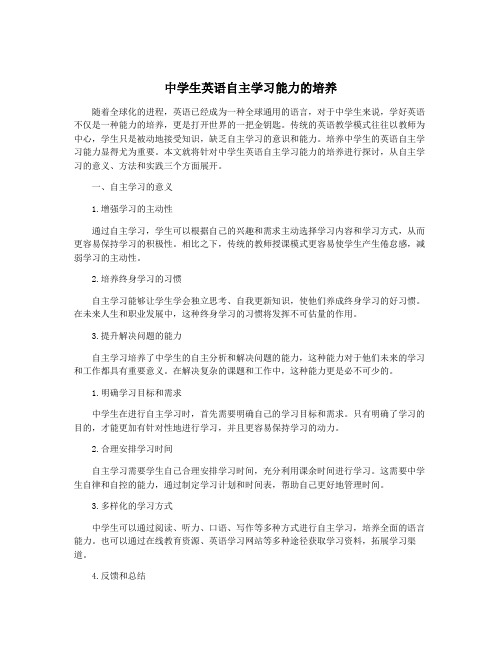
中学生英语自主学习能力的培养随着全球化的进程,英语已经成为一种全球通用的语言,对于中学生来说,学好英语不仅是一种能力的培养,更是打开世界的一把金钥匙。
传统的英语教学模式往往以教师为中心,学生只是被动地接受知识,缺乏自主学习的意识和能力。
培养中学生的英语自主学习能力显得尤为重要。
本文就将针对中学生英语自主学习能力的培养进行探讨,从自主学习的意义、方法和实践三个方面展开。
一、自主学习的意义1.增强学习的主动性通过自主学习,学生可以根据自己的兴趣和需求主动选择学习内容和学习方式,从而更容易保持学习的积极性。
相比之下,传统的教师授课模式更容易使学生产生倦怠感,减弱学习的主动性。
2.培养终身学习的习惯自主学习能够让学生学会独立思考、自我更新知识,使他们养成终身学习的好习惯。
在未来人生和职业发展中,这种终身学习的习惯将发挥不可估量的作用。
3.提升解决问题的能力自主学习培养了中学生的自主分析和解决问题的能力,这种能力对于他们未来的学习和工作都具有重要意义。
在解决复杂的课题和工作中,这种能力更是必不可少的。
1.明确学习目标和需求中学生在进行自主学习时,首先需要明确自己的学习目标和需求。
只有明确了学习的目的,才能更加有针对性地进行学习,并且更容易保持学习的动力。
2.合理安排学习时间自主学习需要学生自己合理安排学习时间,充分利用课余时间进行学习。
这需要中学生自律和自控的能力,通过制定学习计划和时间表,帮助自己更好地管理时间。
3.多样化的学习方式中学生可以通过阅读、听力、口语、写作等多种方式进行自主学习,培养全面的语言能力。
也可以通过在线教育资源、英语学习网站等多种途径获取学习资料,拓展学习渠道。
4.反馈和总结在自主学习的过程中,中学生需要不断地进行学习反馈和总结,及时发现自己的不足和问题,然后调整学习策略,不断完善自己的学习方法,提高学习效果。
1.学校教育学校教育是培养中学生自主学习能力的关键环节,学校可以通过课程设置、教学方法等方面,引导学生树立自主学习的意识。
最新-初中英语自主学习能力的培养5篇 精品
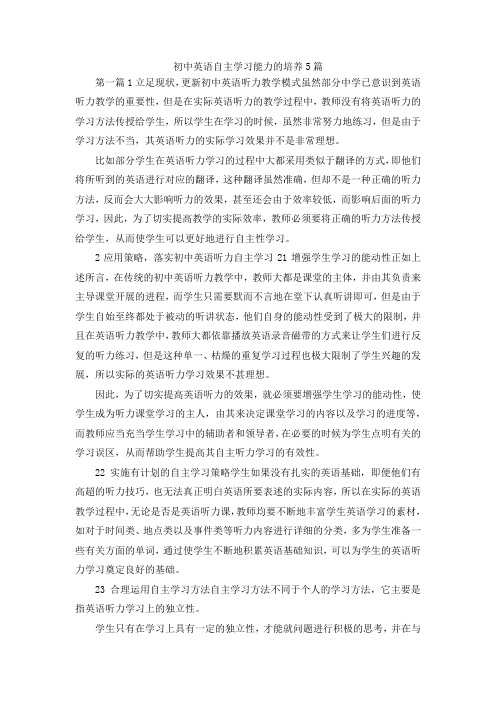
初中英语自主学习能力的培养5篇第一篇1立足现状,更新初中英语听力教学模式虽然部分中学已意识到英语听力教学的重要性,但是在实际英语听力的教学过程中,教师没有将英语听力的学习方法传授给学生,所以学生在学习的时候,虽然非常努力地练习,但是由于学习方法不当,其英语听力的实际学习效果并不是非常理想。
比如部分学生在英语听力学习的过程中大都采用类似于翻译的方式,即他们将所听到的英语进行对应的翻译,这种翻译虽然准确,但却不是一种正确的听力方法,反而会大大影响听力的效果,甚至还会由于效率较低,而影响后面的听力学习,因此,为了切实提高教学的实际效率,教师必须要将正确的听力方法传授给学生,从而使学生可以更好地进行自主性学习。
2应用策略,落实初中英语听力自主学习21增强学生学习的能动性正如上述所言,在传统的初中英语听力教学中,教师大都是课堂的主体,并由其负责来主导课堂开展的进程,而学生只需要默而不言地在堂下认真听讲即可,但是由于学生自始至终都处于被动的听讲状态,他们自身的能动性受到了极大的限制,并且在英语听力教学中,教师大都依靠播放英语录音磁带的方式来让学生们进行反复的听力练习,但是这种单一、枯燥的重复学习过程也极大限制了学生兴趣的发展,所以实际的英语听力学习效果不甚理想。
因此,为了切实提高英语听力的效果,就必须要增强学生学习的能动性,使学生成为听力课堂学习的主人,由其来决定课堂学习的内容以及学习的进度等,而教师应当充当学生学习中的辅助者和领导者,在必要的时候为学生点明有关的学习误区,从而帮助学生提高其自主听力学习的有效性。
22实施有计划的自主学习策略学生如果没有扎实的英语基础,即便他们有高超的听力技巧,也无法真正明白英语所要表述的实际内容,所以在实际的英语教学过程中,无论是否是英语听力课,教师均要不断地丰富学生英语学习的素材,如对于时间类、地点类以及事件类等听力内容进行详细的分类,多为学生准备一些有关方面的单词,通过使学生不断地积累英语基础知识,可以为学生的英语听力学习奠定良好的基础。
浅谈中学生英语自主学习能力的培养
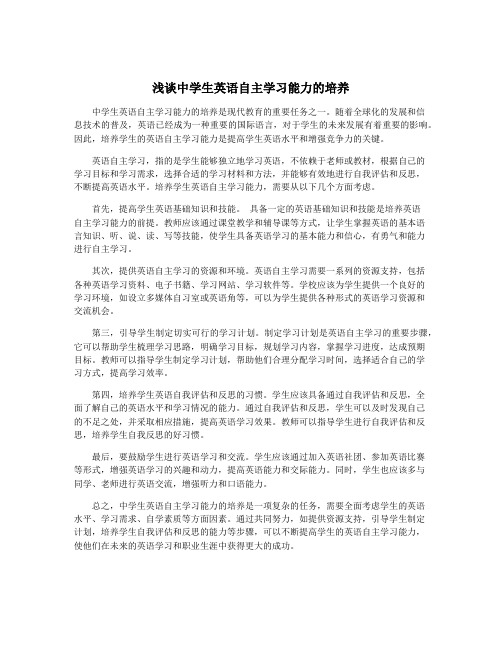
浅谈中学生英语自主学习能力的培养中学生英语自主学习能力的培养是现代教育的重要任务之一。
随着全球化的发展和信息技术的普及,英语已经成为一种重要的国际语言,对于学生的未来发展有着重要的影响。
因此,培养学生的英语自主学习能力是提高学生英语水平和增强竞争力的关键。
英语自主学习,指的是学生能够独立地学习英语,不依赖于老师或教材,根据自己的学习目标和学习需求,选择合适的学习材料和方法,并能够有效地进行自我评估和反思,不断提高英语水平。
培养学生英语自主学习能力,需要从以下几个方面考虑。
首先,提高学生英语基础知识和技能。
具备一定的英语基础知识和技能是培养英语自主学习能力的前提。
教师应该通过课堂教学和辅导课等方式,让学生掌握英语的基本语言知识、听、说、读、写等技能,使学生具备英语学习的基本能力和信心,有勇气和能力进行自主学习。
其次,提供英语自主学习的资源和环境。
英语自主学习需要一系列的资源支持,包括各种英语学习资料、电子书籍、学习网站、学习软件等。
学校应该为学生提供一个良好的学习环境,如设立多媒体自习室或英语角等,可以为学生提供各种形式的英语学习资源和交流机会。
第三,引导学生制定切实可行的学习计划。
制定学习计划是英语自主学习的重要步骤,它可以帮助学生梳理学习思路,明确学习目标,规划学习内容,掌握学习进度,达成预期目标。
教师可以指导学生制定学习计划,帮助他们合理分配学习时间,选择适合自己的学习方式,提高学习效率。
第四,培养学生英语自我评估和反思的习惯。
学生应该具备通过自我评估和反思,全面了解自己的英语水平和学习情况的能力。
通过自我评估和反思,学生可以及时发现自己的不足之处,并采取相应措施,提高英语学习效果。
教师可以指导学生进行自我评估和反思,培养学生自我反思的好习惯。
最后,要鼓励学生进行英语学习和交流。
学生应该通过加入英语社团、参加英语比赛等形式,增强英语学习的兴趣和动力,提高英语能力和交际能力。
同时,学生也应该多与同学、老师进行英语交流,增强听力和口语能力。
浅谈中学生英语自主学习能力的培养
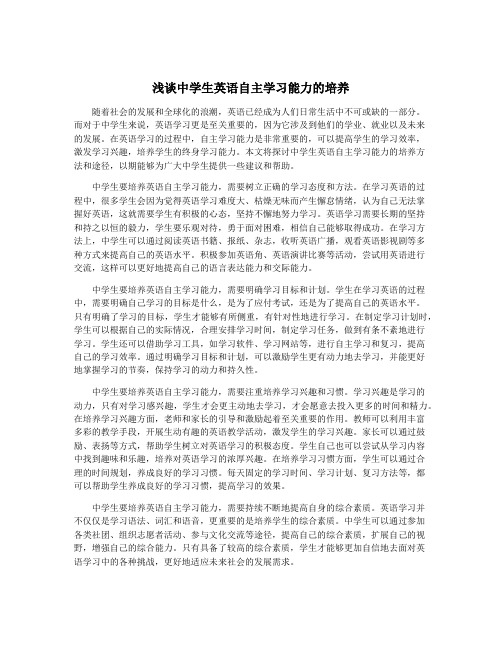
浅谈中学生英语自主学习能力的培养随着社会的发展和全球化的浪潮,英语已经成为人们日常生活中不可或缺的一部分。
而对于中学生来说,英语学习更是至关重要的,因为它涉及到他们的学业、就业以及未来的发展。
在英语学习的过程中,自主学习能力是非常重要的,可以提高学生的学习效率,激发学习兴趣,培养学生的终身学习能力。
本文将探讨中学生英语自主学习能力的培养方法和途径,以期能够为广大中学生提供一些建议和帮助。
中学生要培养英语自主学习能力,需要树立正确的学习态度和方法。
在学习英语的过程中,很多学生会因为觉得英语学习难度大、枯燥无味而产生懈怠情绪,认为自己无法掌握好英语,这就需要学生有积极的心态,坚持不懈地努力学习。
英语学习需要长期的坚持和持之以恒的毅力,学生要乐观对待,勇于面对困难,相信自己能够取得成功。
在学习方法上,中学生可以通过阅读英语书籍、报纸、杂志,收听英语广播,观看英语影视剧等多种方式来提高自己的英语水平。
积极参加英语角、英语演讲比赛等活动,尝试用英语进行交流,这样可以更好地提高自己的语言表达能力和交际能力。
中学生要培养英语自主学习能力,需要明确学习目标和计划。
学生在学习英语的过程中,需要明确自己学习的目标是什么,是为了应付考试,还是为了提高自己的英语水平。
只有明确了学习的目标,学生才能够有所侧重,有针对性地进行学习。
在制定学习计划时,学生可以根据自己的实际情况,合理安排学习时间,制定学习任务,做到有条不紊地进行学习。
学生还可以借助学习工具,如学习软件、学习网站等,进行自主学习和复习,提高自己的学习效率。
通过明确学习目标和计划,可以激励学生更有动力地去学习,并能更好地掌握学习的节奏,保持学习的动力和持久性。
中学生要培养英语自主学习能力,需要注重培养学习兴趣和习惯。
学习兴趣是学习的动力,只有对学习感兴趣,学生才会更主动地去学习,才会愿意去投入更多的时间和精力。
在培养学习兴趣方面,老师和家长的引导和激励起着至关重要的作用。
浅谈中学生英语自主学习能力的培养

浅谈中学生英语自主学习能力的培养【摘要】中学生英语自主学习能力的培养对于他们未来的发展至关重要。
本文通过对中学生英语学习现状和英语自主学习能力的重要性的概述,探讨了提高学生学习动机、培养学生自主学习习惯、引导学生学习方法、拓展学生学习资源、促进学生交流合作等方面的方法。
最后总结了中学生英语自主学习能力的重要性,展望了未来的发展,并指出对学校教育的启示。
通过培养学生的自主学习能力,可以帮助他们更好地适应未来社会的挑战,提高他们的综合素养和竞争力。
教育工作者和家长们需要重视并引导中学生英语自主学习能力的培养。
【关键词】中学生、英语、自主学习能力、培养、学习动机、学习习惯、学习方法、学习资源、交流合作、现状、重要性、未来发展、学校教育、启示。
1. 引言1.1 概述中学生英语学习现状中学生英语学习现状十分复杂多样,一方面,随着全球化进程的加速,英语已经成为全球通用语言,对于中学生来说,掌握英语不仅是一种语言能力,更是提升自身竞争力的重要方式。
许多中学生开始重视英语学习,并且投入了大量时间和精力来提高自己的英语水平。
也有一部分中学生对英语学习持有消极态度,觉得学习英语困难、枯燥,缺乏主动性和动力。
他们可能只是为了完成学业要求而学习英语,而非出于自身的兴趣和需求。
这种被动式的学习方式导致他们的英语水平提升缓慢,学习效果不佳,进而影响到他们未来的发展和就业前景。
要想提高中学生的英语学习水平,培养他们的英语自主学习能力,就必须深入了解当前中学生英语学习的现状,分析存在的问题和挑战,有针对性地制定有效的培养计划和策略,引导中学生走上自主、积极的英语学习之路。
1.2 重视英语自主学习能力的重要性中学生英语自主学习能力的培养对于他们未来的发展至关重要。
随着全球化的发展,英语已经成为世界上最重要的交流语言之一,具备良好的英语能力可以让学生在未来的工作和生活中更具竞争力。
培养学生的英语自主学习能力可以提高他们的学习动机。
浅谈中学生英语自主学习能力的培养
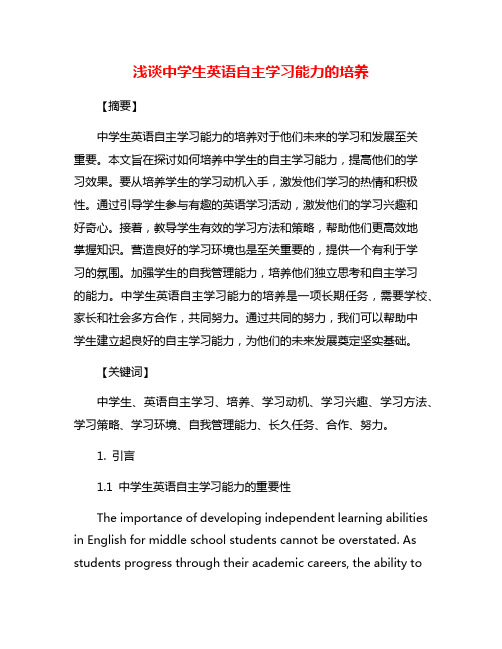
浅谈中学生英语自主学习能力的培养【摘要】中学生英语自主学习能力的培养对于他们未来的学习和发展至关重要。
本文旨在探讨如何培养中学生的自主学习能力,提高他们的学习效果。
要从培养学生的学习动机入手,激发他们学习的热情和积极性。
通过引导学生参与有趣的英语学习活动,激发他们的学习兴趣和好奇心。
接着,教导学生有效的学习方法和策略,帮助他们更高效地掌握知识。
营造良好的学习环境也是至关重要的,提供一个有利于学习的氛围。
加强学生的自我管理能力,培养他们独立思考和自主学习的能力。
中学生英语自主学习能力的培养是一项长期任务,需要学校、家长和社会多方合作,共同努力。
通过共同的努力,我们可以帮助中学生建立起良好的自主学习能力,为他们的未来发展奠定坚实基础。
【关键词】中学生、英语自主学习、培养、学习动机、学习兴趣、学习方法、学习策略、学习环境、自我管理能力、长久任务、合作、努力。
1. 引言1.1 中学生英语自主学习能力的重要性The importance of developing independent learning abilities in English for middle school students cannot be overstated. As students progress through their academic careers, the ability totake control of their own learning becomes increasingly crucial. Cultivating independent learning skills not only enhances students' academic performance but also prepares them for success in higher education and the workforce.1.2 本文目的及意义本文旨在探讨中学生英语自主学习能力的培养,强调其在学习和发展中的重要性。
浅谈中学生英语自主学习能力的培养
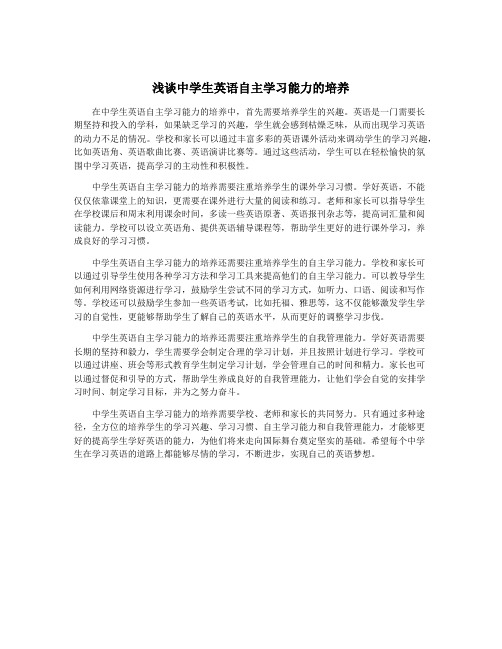
浅谈中学生英语自主学习能力的培养在中学生英语自主学习能力的培养中,首先需要培养学生的兴趣。
英语是一门需要长期坚持和投入的学科,如果缺乏学习的兴趣,学生就会感到枯燥乏味,从而出现学习英语的动力不足的情况。
学校和家长可以通过丰富多彩的英语课外活动来调动学生的学习兴趣,比如英语角、英语歌曲比赛、英语演讲比赛等。
通过这些活动,学生可以在轻松愉快的氛围中学习英语,提高学习的主动性和积极性。
中学生英语自主学习能力的培养需要注重培养学生的课外学习习惯。
学好英语,不能仅仅依靠课堂上的知识,更需要在课外进行大量的阅读和练习。
老师和家长可以指导学生在学校课后和周末利用课余时间,多读一些英语原著、英语报刊杂志等,提高词汇量和阅读能力。
学校可以设立英语角、提供英语辅导课程等,帮助学生更好的进行课外学习,养成良好的学习习惯。
中学生英语自主学习能力的培养还需要注重培养学生的自主学习能力。
学校和家长可以通过引导学生使用各种学习方法和学习工具来提高他们的自主学习能力。
可以教导学生如何利用网络资源进行学习,鼓励学生尝试不同的学习方式,如听力、口语、阅读和写作等。
学校还可以鼓励学生参加一些英语考试,比如托福、雅思等,这不仅能够激发学生学习的自觉性,更能够帮助学生了解自己的英语水平,从而更好的调整学习步伐。
中学生英语自主学习能力的培养还需要注重培养学生的自我管理能力。
学好英语需要长期的坚持和毅力,学生需要学会制定合理的学习计划,并且按照计划进行学习。
学校可以通过讲座、班会等形式教育学生制定学习计划,学会管理自己的时间和精力。
家长也可以通过督促和引导的方式,帮助学生养成良好的自我管理能力,让他们学会自觉的安排学习时间、制定学习目标,并为之努力奋斗。
中学生英语自主学习能力的培养需要学校、老师和家长的共同努力。
只有通过多种途径,全方位的培养学生的学习兴趣、学习习惯、自主学习能力和自我管理能力,才能够更好的提高学生学好英语的能力,为他们将来走向国际舞台奠定坚实的基础。
论英语自主学习能力的培养
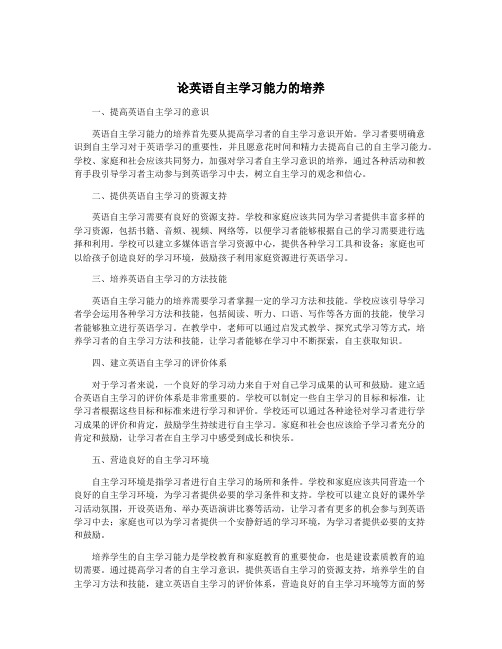
论英语自主学习能力的培养一、提高英语自主学习的意识英语自主学习能力的培养首先要从提高学习者的自主学习意识开始。
学习者要明确意识到自主学习对于英语学习的重要性,并且愿意花时间和精力去提高自己的自主学习能力。
学校、家庭和社会应该共同努力,加强对学习者自主学习意识的培养,通过各种活动和教育手段引导学习者主动参与到英语学习中去,树立自主学习的观念和信心。
二、提供英语自主学习的资源支持英语自主学习需要有良好的资源支持。
学校和家庭应该共同为学习者提供丰富多样的学习资源,包括书籍、音频、视频、网络等,以便学习者能够根据自己的学习需要进行选择和利用。
学校可以建立多媒体语言学习资源中心,提供各种学习工具和设备;家庭也可以给孩子创造良好的学习环境,鼓励孩子利用家庭资源进行英语学习。
三、培养英语自主学习的方法技能英语自主学习能力的培养需要学习者掌握一定的学习方法和技能。
学校应该引导学习者学会运用各种学习方法和技能,包括阅读、听力、口语、写作等各方面的技能,使学习者能够独立进行英语学习。
在教学中,老师可以通过启发式教学、探究式学习等方式,培养学习者的自主学习方法和技能,让学习者能够在学习中不断探索,自主获取知识。
四、建立英语自主学习的评价体系对于学习者来说,一个良好的学习动力来自于对自己学习成果的认可和鼓励。
建立适合英语自主学习的评价体系是非常重要的。
学校可以制定一些自主学习的目标和标准,让学习者根据这些目标和标准来进行学习和评价。
学校还可以通过各种途径对学习者进行学习成果的评价和肯定,鼓励学生持续进行自主学习。
家庭和社会也应该给予学习者充分的肯定和鼓励,让学习者在自主学习中感受到成长和快乐。
五、营造良好的自主学习环境自主学习环境是指学习者进行自主学习的场所和条件。
学校和家庭应该共同营造一个良好的自主学习环境,为学习者提供必要的学习条件和支持。
学校可以建立良好的课外学习活动氛围,开设英语角、举办英语演讲比赛等活动,让学习者有更多的机会参与到英语学习中去;家庭也可以为学习者提供一个安静舒适的学习环境,为学习者提供必要的支持和鼓励。
浅谈中学生英语自主学习能力的培养
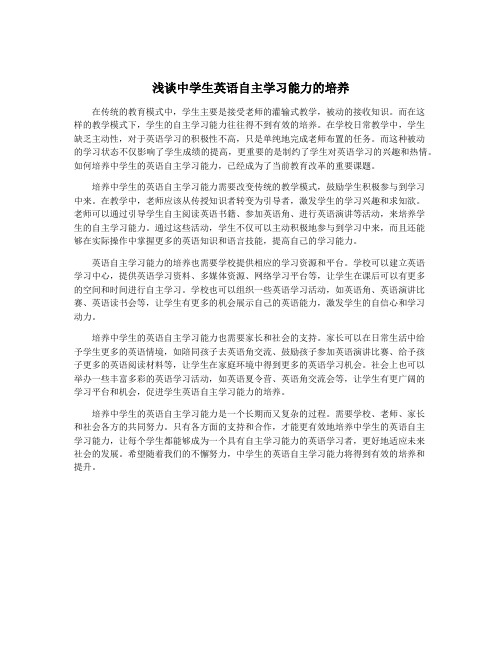
浅谈中学生英语自主学习能力的培养在传统的教育模式中,学生主要是接受老师的灌输式教学,被动的接收知识。
而在这样的教学模式下,学生的自主学习能力往往得不到有效的培养。
在学校日常教学中,学生缺乏主动性,对于英语学习的积极性不高,只是单纯地完成老师布置的任务。
而这种被动的学习状态不仅影响了学生成绩的提高,更重要的是制约了学生对英语学习的兴趣和热情。
如何培养中学生的英语自主学习能力,已经成为了当前教育改革的重要课题。
培养中学生的英语自主学习能力需要改变传统的教学模式,鼓励学生积极参与到学习中来。
在教学中,老师应该从传授知识者转变为引导者,激发学生的学习兴趣和求知欲。
老师可以通过引导学生自主阅读英语书籍、参加英语角、进行英语演讲等活动,来培养学生的自主学习能力。
通过这些活动,学生不仅可以主动积极地参与到学习中来,而且还能够在实际操作中掌握更多的英语知识和语言技能,提高自己的学习能力。
英语自主学习能力的培养也需要学校提供相应的学习资源和平台。
学校可以建立英语学习中心,提供英语学习资料、多媒体资源、网络学习平台等,让学生在课后可以有更多的空间和时间进行自主学习。
学校也可以组织一些英语学习活动,如英语角、英语演讲比赛、英语读书会等,让学生有更多的机会展示自己的英语能力,激发学生的自信心和学习动力。
培养中学生的英语自主学习能力也需要家长和社会的支持。
家长可以在日常生活中给予学生更多的英语情境,如陪同孩子去英语角交流、鼓励孩子参加英语演讲比赛、给予孩子更多的英语阅读材料等,让学生在家庭环境中得到更多的英语学习机会。
社会上也可以举办一些丰富多彩的英语学习活动,如英语夏令营、英语角交流会等,让学生有更广阔的学习平台和机会,促进学生英语自主学习能力的培养。
培养中学生的英语自主学习能力是一个长期而又复杂的过程。
需要学校、老师、家长和社会各方的共同努力。
只有各方面的支持和合作,才能更有效地培养中学生的英语自主学习能力,让每个学生都能够成为一个具有自主学习能力的英语学习者,更好地适应未来社会的发展。
英语专业论文范文
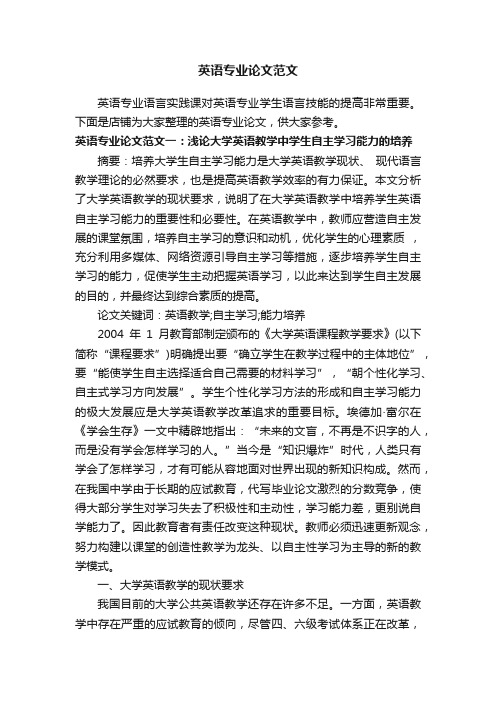
英语专业论文范文英语专业语言实践课对英语专业学生语言技能的提高非常重要。
下面是店铺为大家整理的英语专业论文,供大家参考。
英语专业论文范文一:浅论大学英语教学中学生自主学习能力的培养摘要:培养大学生自主学习能力是大学英语教学现状、现代语言教学理论的必然要求,也是提高英语教学效率的有力保证。
本文分析了大学英语教学的现状要求,说明了在大学英语教学中培养学生英语自主学习能力的重要性和必要性。
在英语教学中,教师应营造自主发展的课堂氛围,培养自主学习的意识和动机,优化学生的心理素质,充分利用多媒体、网络资源引导自主学习等措施,逐步培养学生自主学习的能力,促使学生主动把握英语学习,以此来达到学生自主发展的目的,并最终达到综合素质的提高。
论文关键词:英语教学;自主学习;能力培养2004年1月教育部制定颁布的《大学英语课程教学要求》(以下简称“课程要求”)明确提出要“确立学生在教学过程中的主体地位”,要“能使学生自主选择适合自己需要的材料学习”,“朝个性化学习、自主式学习方向发展”。
学生个性化学习方法的形成和自主学习能力的极大发展应是大学英语教学改革追求的重要目标。
埃德加·富尔在《学会生存》一文中精辟地指出:“未来的文盲,不再是不识字的人,而是没有学会怎样学习的人。
”当今是“知识爆炸”时代,人类只有学会了怎样学习,才有可能从容地面对世界出现的新知识构成。
然而,在我国中学由于长期的应试教育,代写毕业论文激烈的分数竞争,使得大部分学生对学习失去了积极性和主动性,学习能力差,更别说自学能力了。
因此教育者有责任改变这种现状。
教师必须迅速更新观念,努力构建以课堂的创造性教学为龙头、以自主性学习为主导的新的教学模式。
一、大学英语教学的现状要求我国目前的大学公共英语教学还存在许多不足。
一方面,英语教学中存在严重的应试教育的倾向,尽管四、六级考试体系正在改革,本应遵循语言教学规律的英语教学依然残留应试教育的成分,重“教”轻“学”,重“结果”轻“过程”,重“知识传授”轻“学习方法或策略教学与指导”。
浅谈初中英语教学中学生自主学习能力的培养

浅谈初中英语教学中学生自主学习能力的培养随着教育理念的更新和教学方法的不断改革,越来越多的人开始重视学生的自主学习能力。
而在初中英语教学中,培养学生的自主学习能力显得尤为重要。
本文将从培养目标、培养方法和培养意义三个方面浅谈初中英语教学中学生自主学习能力的培养。
一、培养目标在初中英语教学中,培养学生的自主学习能力是非常重要的,因为这不仅是学习英语的目标,更是培养学生终身学习能力的关键。
学生的自主学习能力主要包括对学习目标的认识能力、学习策略的选择和运用能力、自主学习的时间管理能力以及自我评价和反思的能力等。
只有在学生具备了这些自主学习能力,他们才能够更好地进行学习,获得更好的成绩。
二、培养方法针对初中英语学生的自主学习能力的培养方法主要可以从以下几个方面展开:1、激发学生学习的兴趣激发学生学习的主动性是培养自主学习能力的第一步。
教师可以通过设计富有启发性的课堂活动、给予学生一定的自主选择的权利以及鼓励学生表达自己的看法等多种方式来激发学生的求知欲和学习兴趣。
2、培养学生学习的方法教师可以在课堂上通过举例子、引导讨论等方式向学生介绍各种学习方法,比如如何记单词、如何拓展词汇量、如何提高听力和口语能力等。
学校也可以组织一些学习方法的讲座,让学生了解到更多的学习技巧。
3、鼓励学生自主探究在教学中,教师不仅仅是知识的传授者,更应该是学生自主学习的引导者。
教师可以鼓励学生通过阅读、上网检索、实践等方式自主获取知识,同时教师还可以为学生提供一定的学习资源和检索途径,帮助学生更好地进行自主学习。
4、建立合作学习的氛围通过小组合作学习、分角色合作学习等方式,鼓励学生在学习中相互交流、互相学习,培养学生的自主学习能力。
在合作学习中,学生还可以相互帮助、相互鼓励,从而更好地提高学习效果。
三、培养意义培养初中英语学生的自主学习能力有着极为重要的意义。
学生的自主学习能力的培养可以让他们在学习英语时不再依赖于教师,而是能够独立地进行学习,培养他们的自主学习和自我管理的能力。
浅谈中学生英语自主学习能力的培养
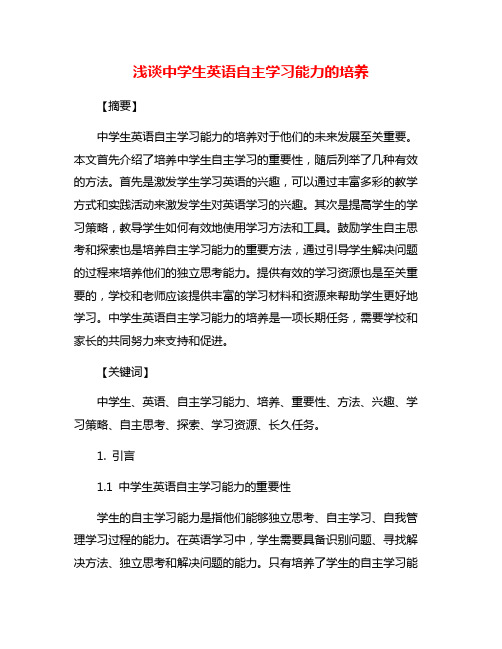
浅谈中学生英语自主学习能力的培养【摘要】中学生英语自主学习能力的培养对于他们的未来发展至关重要。
本文首先介绍了培养中学生自主学习的重要性,随后列举了几种有效的方法。
首先是激发学生学习英语的兴趣,可以通过丰富多彩的教学方式和实践活动来激发学生对英语学习的兴趣。
其次是提高学生的学习策略,教导学生如何有效地使用学习方法和工具。
鼓励学生自主思考和探索也是培养自主学习能力的重要方法,通过引导学生解决问题的过程来培养他们的独立思考能力。
提供有效的学习资源也是至关重要的,学校和老师应该提供丰富的学习材料和资源来帮助学生更好地学习。
中学生英语自主学习能力的培养是一项长期任务,需要学校和家长的共同努力来支持和促进。
【关键词】中学生、英语、自主学习能力、培养、重要性、方法、兴趣、学习策略、自主思考、探索、学习资源、长久任务。
1. 引言1.1 中学生英语自主学习能力的重要性学生的自主学习能力是指他们能够独立思考、自主学习、自我管理学习过程的能力。
在英语学习中,学生需要具备识别问题、寻找解决方法、独立思考和解决问题的能力。
只有培养了学生的自主学习能力,他们才能在学习中不依赖他人,主动寻找解决问题的方法,提高学习的有效性和效率。
随着社会的不断发展和变化,传统的教育模式已经不能满足学生的学习需求。
通过培养学生的自主学习能力,可以激发学生的学习兴趣,提高他们的学习主动性和创造性,使他们能够适应未来社会的需求。
中学生英语自主学习能力的培养具有非常重要的意义和价值。
2. 正文2.1 培养中学生自主学习的方法There are several methods to cultivate middle school students' autonomous learning in English. Firstly, teachers can encourage students to set their own learning goals and be responsible for their own progress. This can help students develop a sense of ownership over their learning and motivate them to take initiative in their studies.2.2 激发学生学习英语的兴趣激发学生学习英语的兴趣是培养中学生英语自主学习能力的重要环节之一。
浅谈高中英语教学中学生自主学习能力的培养

浅谈高中英语教学中学生自主学习能力的培养引言自主学习能力是学生在高中英语教学过程中必须培养和发展的重要能力之一。
培养学生的自主学习能力是以提高学生的综合素质为目标的一项重要任务。
本文将就高中英语教学中如何培养学生的自主学习能力进行探讨。
自主学习的意义自主学习是指学生在教师指导下主动参与、独立思考和自我调控学习过程的能力。
在高中英语教学中,培养学生的自主学习能力具有以下几个方面的意义。
•培养学生的学习兴趣和学习动力。
通过自主学习,学生能够更好地发现学习的乐趣,提高学习的积极性和主动性。
•提高学生的学习效果和学习质量。
自主学习能够帮助学生形成有效的学习方法和学习策略,提高学习的效果和质量。
•增强学生的综合素质和能力。
自主学习中,学生需要独立思考、主动合作,这有助于培养学生的创新思维能力、沟通能力和解决问题的能力。
•为学生未来的学习和发展打下坚实的基础。
自主学习是一种终身学习的能力,培养学生的自主学习能力有助于他们更好地适应未来的学习和工作。
培养学生自主学习能力的方法提高学生的学习兴趣和学习动力学习兴趣和学习动力是培养学生自主学习能力的关键。
教师可以通过以下方法来提高学生的学习兴趣和学习动力。
1.创设良好的学习环境。
教师可以通过布置合理的学习任务和激发学生的好奇心,创造积极向上的学习氛围,激发学生的学习兴趣。
2.引导学生参与课堂讨论和合作学习。
通过让学生积极参与课堂讨论和小组合作学习,培养学生的合作意识和学习动力。
3.创设情境式学习。
教师可以利用多媒体教学手段,设计情境式学习活动,提高学生的学习兴趣和参与度。
培养学生的自主学习能力学生的自主学习能力是在教师指导下,根据学科特点和学生个体差异,适时培养和发展的。
以下是一些培养学生自主学习能力的方法。
1.注重学生学习方法的指导。
教师可以通过讲解学习方法和技巧,教导学生如何高效地阅读、写作和口语表达等,培养学生良好的学习习惯。
2.引导学生独立探究和分析问题。
浅谈中学生英语自主学习能力的培养
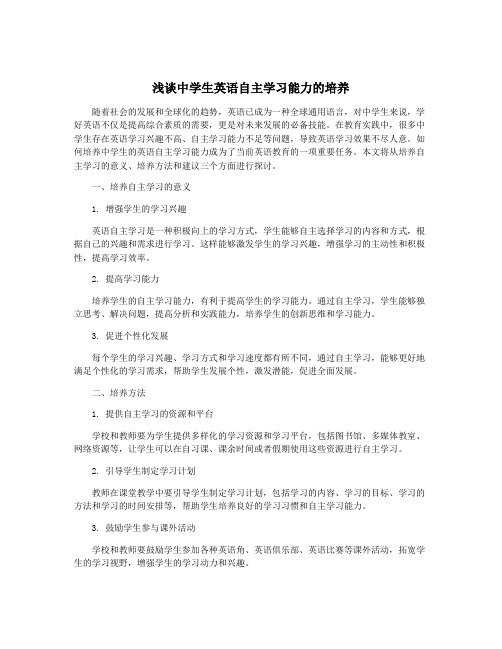
浅谈中学生英语自主学习能力的培养随着社会的发展和全球化的趋势,英语已成为一种全球通用语言,对中学生来说,学好英语不仅是提高综合素质的需要,更是对未来发展的必备技能。
在教育实践中,很多中学生存在英语学习兴趣不高、自主学习能力不足等问题,导致英语学习效果不尽人意。
如何培养中学生的英语自主学习能力成为了当前英语教育的一项重要任务。
本文将从培养自主学习的意义、培养方法和建议三个方面进行探讨。
一、培养自主学习的意义1. 增强学生的学习兴趣英语自主学习是一种积极向上的学习方式,学生能够自主选择学习的内容和方式,根据自己的兴趣和需求进行学习。
这样能够激发学生的学习兴趣,增强学习的主动性和积极性,提高学习效率。
2. 提高学习能力培养学生的自主学习能力,有利于提高学生的学习能力。
通过自主学习,学生能够独立思考、解决问题,提高分析和实践能力,培养学生的创新思维和学习能力。
3. 促进个性化发展每个学生的学习兴趣、学习方式和学习速度都有所不同,通过自主学习,能够更好地满足个性化的学习需求,帮助学生发展个性,激发潜能,促进全面发展。
二、培养方法1. 提供自主学习的资源和平台学校和教师要为学生提供多样化的学习资源和学习平台,包括图书馆、多媒体教室、网络资源等,让学生可以在自习课、课余时间或者假期使用这些资源进行自主学习。
2. 引导学生制定学习计划教师在课堂教学中要引导学生制定学习计划,包括学习的内容、学习的目标、学习的方法和学习的时间安排等,帮助学生培养良好的学习习惯和自主学习能力。
3. 鼓励学生参与课外活动学校和教师要鼓励学生参加各种英语角、英语俱乐部、英语比赛等课外活动,拓宽学生的学习视野,增强学生的学习动力和兴趣。
4. 培养学生的自主学习能力教师要在日常的教学中引导学生进行自主学习,在学生完成教师布置的任务后,鼓励学生进行拓展性学习,挖掘更多的学习资源,提高自主学习能力。
三、建议1. 建立健全的评价体系学校和教师要建立健全的自主学习评价体系,既要注重学生学习成果的评价,更要注重学生学习过程的评价,包括学生的学习动机、学习方法、学习态度等。
论高中英语教学中学生自主学习能力的培养
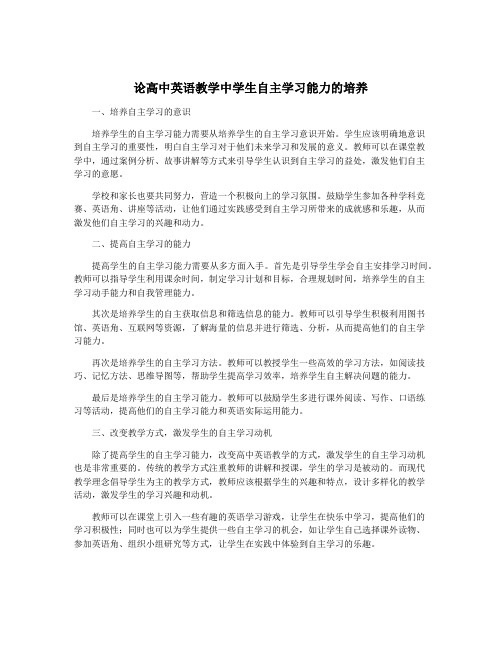
论高中英语教学中学生自主学习能力的培养一、培养自主学习的意识培养学生的自主学习能力需要从培养学生的自主学习意识开始。
学生应该明确地意识到自主学习的重要性,明白自主学习对于他们未来学习和发展的意义。
教师可以在课堂教学中,通过案例分析、故事讲解等方式来引导学生认识到自主学习的益处,激发他们自主学习的意愿。
学校和家长也要共同努力,营造一个积极向上的学习氛围。
鼓励学生参加各种学科竞赛、英语角、讲座等活动,让他们通过实践感受到自主学习所带来的成就感和乐趣,从而激发他们自主学习的兴趣和动力。
二、提高自主学习的能力提高学生的自主学习能力需要从多方面入手。
首先是引导学生学会自主安排学习时间。
教师可以指导学生利用课余时间,制定学习计划和目标,合理规划时间,培养学生的自主学习动手能力和自我管理能力。
其次是培养学生的自主获取信息和筛选信息的能力。
教师可以引导学生积极利用图书馆、英语角、互联网等资源,了解海量的信息并进行筛选、分析,从而提高他们的自主学习能力。
再次是培养学生的自主学习方法。
教师可以教授学生一些高效的学习方法,如阅读技巧、记忆方法、思维导图等,帮助学生提高学习效率,培养学生自主解决问题的能力。
最后是培养学生的自主学习能力。
教师可以鼓励学生多进行课外阅读、写作、口语练习等活动,提高他们的自主学习能力和英语实际运用能力。
三、改变教学方式,激发学生的自主学习动机除了提高学生的自主学习能力,改变高中英语教学的方式,激发学生的自主学习动机也是非常重要的。
传统的教学方式注重教师的讲解和授课,学生的学习是被动的。
而现代教学理念倡导学生为主的教学方式,教师应该根据学生的兴趣和特点,设计多样化的教学活动,激发学生的学习兴趣和动机。
教师可以在课堂上引入一些有趣的英语学习游戏,让学生在快乐中学习,提高他们的学习积极性;同时也可以为学生提供一些自主学习的机会,如让学生自己选择课外读物、参加英语角、组织小组研究等方式,让学生在实践中体验到自主学习的乐趣。
浅谈高中英语教学中学生自主学习能力的培养

浅谈高中英语教学中学生自主学习能力的培养前言英语作为一门国际性语言,在现代社会中具备重要的地位。
在高中学生阶段,学习英语是必修科目,其内容包括英语语音、语法和词汇等。
然而,单纯的注意力讲解、理解和记忆,并不能使学生在语言运用中得到很好的体现,因此在高中英语教学中,培养学生的自主学习能力至关重要。
本篇论文将探讨在高中英语教学中,如何培养学生的自主学习能力。
学生自主学习能力的概念学生自主学习能力是指学生在学习过程中能够主动发掘问题、积极思考、充分探究问题、寻找信息和解决问题的能力。
学生在自主学习中不仅能够提高学习效果,更能够提升对知识的理解和运用能力。
学生自主学习能力的培养方法1. 激发学生兴趣学生在学习过程中最需要的是兴趣,仅仅是背诵和训练并不能激发学生的学习热情。
因此,老师在教学过程中需要注意课堂内容的吸引力和趣味性,从而激发学生的学习兴趣。
2. 培养学生的学习意识培养学生的学习意识,可以使学生明确学习的目标和方向,从而在学习中做到有的放矢。
老师可以为学生制定明确的学习计划,让学生在学习中充分认识到自己的学习差距,找到适合自己的学习策略和方法。
3. 鼓励学生参与学生的自主学习能力的培养需要学生主动参与,老师在教学过程中可以多向学生提出问题,并鼓励学生参与到课堂讨论中,或是引导学生自己提出问题并思考解决方法。
这不仅能够提高学生的自主学习能力,同时也能够提高学生的思维和表达能力。
4. 提供学习资源和平台学生在自主学习中需要有足够的资源和平台,老师可以在学习资源和资料上提供谷歌学者或百度学术等搜索引擎,让学生在自主学习中更好地获取有效信息和资料。
结语高中英语不仅是一门学科学习,更是在当前时代必须掌握的一种技能。
在高中英语教学中,培养学生的自主学习能力对于促进学生的英语学习能力的提高具备重要意义。
因此,教师需要通过多种方法如培养学生的学习意识、鼓励学生参与等来提高学生的自主学习能力,以更好地实现教学目标,让学生在自主学习中更全面地发展自身能力。
浅谈中学生英语自主学习能力的培养
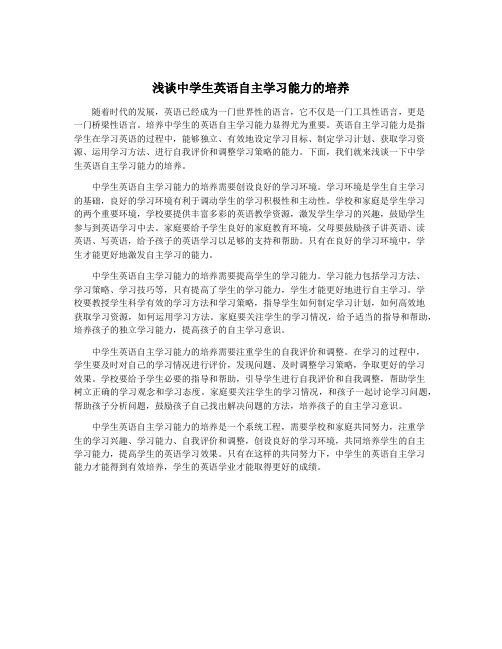
浅谈中学生英语自主学习能力的培养随着时代的发展,英语已经成为一门世界性的语言,它不仅是一门工具性语言,更是一门桥梁性语言。
培养中学生的英语自主学习能力显得尤为重要。
英语自主学习能力是指学生在学习英语的过程中,能够独立、有效地设定学习目标、制定学习计划、获取学习资源、运用学习方法、进行自我评价和调整学习策略的能力。
下面,我们就来浅谈一下中学生英语自主学习能力的培养。
中学生英语自主学习能力的培养需要创设良好的学习环境。
学习环境是学生自主学习的基础,良好的学习环境有利于调动学生的学习积极性和主动性。
学校和家庭是学生学习的两个重要环境,学校要提供丰富多彩的英语教学资源,激发学生学习的兴趣,鼓励学生参与到英语学习中去。
家庭要给予学生良好的家庭教育环境,父母要鼓励孩子讲英语、读英语、写英语,给予孩子的英语学习以足够的支持和帮助。
只有在良好的学习环境中,学生才能更好地激发自主学习的能力。
中学生英语自主学习能力的培养需要提高学生的学习能力。
学习能力包括学习方法、学习策略、学习技巧等,只有提高了学生的学习能力,学生才能更好地进行自主学习。
学校要教授学生科学有效的学习方法和学习策略,指导学生如何制定学习计划,如何高效地获取学习资源,如何运用学习方法。
家庭要关注学生的学习情况,给予适当的指导和帮助,培养孩子的独立学习能力,提高孩子的自主学习意识。
中学生英语自主学习能力的培养需要注重学生的自我评价和调整。
在学习的过程中,学生要及时对自己的学习情况进行评价,发现问题、及时调整学习策略,争取更好的学习效果。
学校要给予学生必要的指导和帮助,引导学生进行自我评价和自我调整,帮助学生树立正确的学习观念和学习态度。
家庭要关注学生的学习情况,和孩子一起讨论学习问题,帮助孩子分析问题,鼓励孩子自己找出解决问题的方法,培养孩子的自主学习意识。
中学生英语自主学习能力的培养是一个系统工程,需要学校和家庭共同努力,注重学生的学习兴趣、学习能力、自我评价和调整,创设良好的学习环境,共同培养学生的自主学习能力,提高学生的英语学习效果。
浅谈初中英语教学中学生自主学习能力的培养
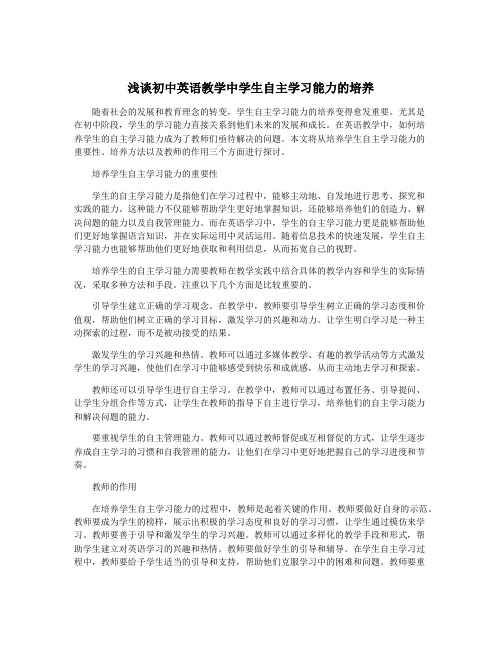
浅谈初中英语教学中学生自主学习能力的培养随着社会的发展和教育理念的转变,学生自主学习能力的培养变得愈发重要。
尤其是在初中阶段,学生的学习能力直接关系到他们未来的发展和成长。
在英语教学中,如何培养学生的自主学习能力成为了教师们亟待解决的问题。
本文将从培养学生自主学习能力的重要性、培养方法以及教师的作用三个方面进行探讨。
培养学生自主学习能力的重要性学生的自主学习能力是指他们在学习过程中,能够主动地、自发地进行思考、探究和实践的能力。
这种能力不仅能够帮助学生更好地掌握知识,还能够培养他们的创造力、解决问题的能力以及自我管理能力。
而在英语学习中,学生的自主学习能力更是能够帮助他们更好地掌握语言知识,并在实际运用中灵活运用。
随着信息技术的快速发展,学生自主学习能力也能够帮助他们更好地获取和利用信息,从而拓宽自己的视野。
培养学生的自主学习能力需要教师在教学实践中结合具体的教学内容和学生的实际情况,采取多种方法和手段。
注重以下几个方面是比较重要的。
引导学生建立正确的学习观念。
在教学中,教师要引导学生树立正确的学习态度和价值观,帮助他们树立正确的学习目标,激发学习的兴趣和动力。
让学生明白学习是一种主动探索的过程,而不是被动接受的结果。
激发学生的学习兴趣和热情。
教师可以通过多媒体教学、有趣的教学活动等方式激发学生的学习兴趣,使他们在学习中能够感受到快乐和成就感,从而主动地去学习和探索。
教师还可以引导学生进行自主学习。
在教学中,教师可以通过布置任务、引导提问、让学生分组合作等方式,让学生在教师的指导下自主进行学习,培养他们的自主学习能力和解决问题的能力。
要重视学生的自主管理能力。
教师可以通过教师督促或互相督促的方式,让学生逐步养成自主学习的习惯和自我管理的能力,让他们在学习中更好地把握自己的学习进度和节奏。
教师的作用在培养学生自主学习能力的过程中,教师是起着关键的作用。
教师要做好自身的示范。
教师要成为学生的榜样,展示出积极的学习态度和良好的学习习惯,让学生通过模仿来学习。
浅谈中学生英语自主学习能力的培养
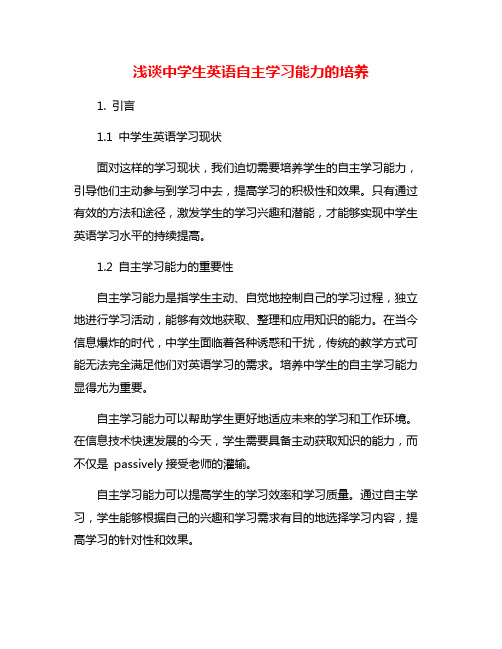
浅谈中学生英语自主学习能力的培养1. 引言1.1 中学生英语学习现状面对这样的学习现状,我们迫切需要培养学生的自主学习能力,引导他们主动参与到学习中去,提高学习的积极性和效果。
只有通过有效的方法和途径,激发学生的学习兴趣和潜能,才能够实现中学生英语学习水平的持续提高。
1.2 自主学习能力的重要性自主学习能力是指学生主动、自觉地控制自己的学习过程,独立地进行学习活动,能够有效地获取、整理和应用知识的能力。
在当今信息爆炸的时代,中学生面临着各种诱惑和干扰,传统的教学方式可能无法完全满足他们对英语学习的需求。
培养中学生的自主学习能力显得尤为重要。
自主学习能力可以帮助学生更好地适应未来的学习和工作环境。
在信息技术快速发展的今天,学生需要具备主动获取知识的能力,而不仅是passively接受老师的灌输。
自主学习能力可以提高学生的学习效率和学习质量。
通过自主学习,学生能够根据自己的兴趣和学习需求有目的地选择学习内容,提高学习的针对性和效果。
自主学习能力也可以培养学生的自信心和独立思考能力。
在学习过程中,学生需要自主的解决问题,逐步提高自己的学习能力和解决问题的能力。
中学生的自主学习能力对他们未来的发展至关重要。
只有通过积极培养学生的自主学习能力,才能帮助他们更好地适应社会的发展变化,提高自己的学习水平。
2. 正文2.1 理解自主学习的概念理解自主学习的概念是指学生在学习过程中能够独立思考、自我管理、自我激励和自我评价的能力。
自主学习是一种积极主动的学习方式,其核心在于学生的自主性和自发性。
自主学习的概念不同于传统的被动接受式学习模式,它要求学生树立起自我管理、主动思考和解决问题的意识。
理解自主学习的概念对中学生英语学习至关重要。
在学习英语的过程中,学生需要具备探究精神和主动学习的态度,而不是仅仅依靠老师的指导和教导。
通过自主学习,学生能够更好地掌握学习的节奏和进度,提高学习的效率和质量。
中学生理解自主学习的概念还能够帮助他们培养一种持久的学习动力。
- 1、下载文档前请自行甄别文档内容的完整性,平台不提供额外的编辑、内容补充、找答案等附加服务。
- 2、"仅部分预览"的文档,不可在线预览部分如存在完整性等问题,可反馈申请退款(可完整预览的文档不适用该条件!)。
- 3、如文档侵犯您的权益,请联系客服反馈,我们会尽快为您处理(人工客服工作时间:9:00-18:30)。
On Developing Middle School Students’Autonomous Learning Ability in EnglishAbstract: Autonomous learning ability is one of the most important abilities in English learning. In the volatile information ages, in special, the autonomous learning is necessary for everyone else’s life-long learning and life-long development. However, most of the current middle school students are lack of this learning ability. The mind of waiting, dependence and demanding has gradually increased among them. Basically, they are forced to learn with the accompaniment by their parents and the rigorous monitoring of their teachers. As a result, children (students) themselves are unwilling to learn; their parents are very tired with doing so but have no choice and even worse, their teachers have no idea on what to do. Through most current studies, one of the findings is that the problem of lacking autonomy is virtually serious among middle school students, since it is difficult for them to control themselves or to take their responsibilities for their English learning, which has raised people’s widespread concerns. After researching and studying, another finding is that the reasons for lacking autonomy are various. Apart from some reasons from students themselves, family, school, as well as society should be blamed. The main solution of this problem is that the whole society should focus enough attention on developing the learning autonomy of middle school students.Key words: autonomous learning ability;develop; dependence; English learning摘要: 在英语学习过程中,自主学习能力是学习者不可缺少的能力之一,尤其在这瞬息万变的信息时代里,自主学习更是促进其终身学习和终身发展的需要。
然而当代的中学生,却出现了自主学习能力“荒”的现象。
等、靠(依赖)、要的思想在他们当中不断助长。
他们基本上是在父母的陪伴下,老师的严格监督下进行压迫式的学习,其结果是孩子(学生)很不情愿,父母既无赖又辛苦,老师为此很是头疼。
通过对当前中学生英语学习情况的研究,发现当代的中学生很难自己管好自己学好英语,很难对自己的英语学习负责,缺乏独立自主能力的情况比较严重,很让人堪忧;经过研究还得出了产生这种现象的原因和解决办法,其中有除了有来自个人、家庭以及学校的原因外,同时也有来自社会的原因,因此得出的解决办法是:我们全社会,应该重视中学生英语学习自主能力的培养。
关键词: 自主学习能力; 培养; 依赖; 英语学习Ⅰ.Introduction1.1 Significance of this researchWith the development of science and technology, knowledge is being replaced faster and faster. The students nowadays must be cultivated into lifelong learners to adjust themselves to the times of knowledge explosion. The ultimate goal of English teaching in China is to develop learners’ communicative competence and go od learning strategies, so as to become autonomous language learners and users. Everyone knows school education is very important and useful. Yet no one can learn everything from school. So much more is to be learned outside school by students themselves.Thus that is, the sense of learning autonomy is the essential mind for English learning. Without the sense of learning autonomy, autonomous learning will be just like water without source;establishing a sense of learning autonomy means that students should realize very clearly that it is they themselves not teachers who should take the responsibility for their learning (Huang & Zhang, 2007).Many studies have indicated that autonomous learning is an effective way to cultivate students’ English learning ability in middle school, by which students can show their interests, develop study skills and enhance their creativity.1.2 Purpose of this paperWith the methodology of literature review, this study is to arouse students to be aware of the importance of autonomy in middle school English learning and to enable them to have a positive attitude toward English learning. Consequently, with the help of autonomy, middle school students will become independent in English learning. After gaining the acknowledge of autonomy, the whole society, including current schools, parents, and students themselves, will realize that we all should pay lots of attention on developing autonomy in English learning.Ⅱ. Definitions of Learning AutonomyLearning autonomy refers to the capability to determine the learning objectives, select methods, monitor the procedure and evaluate the results (Zimmerman, 1996). As Cotterall (1995) said autonomous learning can be defined as “the extent to which learners demonstrate the ability to use a set of tactics for taking their learning”. According to Littlewood (1998) a student’s autonomy should include the two features:①Students should take responsibility for their own learning.②Taking responsibility involves learners in taking ownership (partial or total) of many processes which have traditionally belonged to the teacher, such as deciding on learning objectives, selecting learning methods and evaluating process.“Autonomy occurs when one uses personal processes to strategically monitor and control his or her be havior and the environment” (Chen, 2008). Autonomy in educational contexts determines how students personally activate, alter, and sustain their learning (Zimmerman, 1996).Though the definitions of autonomous learning mentioned above are various, they have something in common. First, learners should be independent. Second, learners should take responsibility for their own learning. Third, learners should have abilities of self-management and control over cognitive process.To all intents and purposes, the autonomous learner takes an active role in the learning process, generating ideas and availing himself of learning opportunities, rather than simply reacting to various stimuli of the teacher (Guo, 2008). However, the author regards that autonomous learning, especially for middle school students, is awareness or a kind of ability that learners study English more actively and efficiently because they cannot work like college students to select the contents or determine the objectives. And also autonomous learning is a process, which is gradual, cumulative and collaborative.Ⅲ. Advantages of Autonomous Learning3.1 More Opportunities of Independent LearningStudents have more opportunities of independent learning. Not like passive learning, autonomous learning requires that students should select learning resources, methods and time by themselves. One does not become autonomous fully; one only works towards autonomy.Students have more opportunities to learn and think independently in autonomous learning than in any other learning model. More opportunities for autonomous learning and taking part in classroom activities can develop students’ passion for language learning, and help them to perform actively in the classes, which ultimately will increase the efficiency of learning (Thanasoulas, D. 2000). There is a reason that it is impossible for students to master all that teachers have mentioned in the classes. As a result, they need a process of practicing and learning to entirely master the input in classroom teaching. Furthermore, it is not enough for students to master a foreign language indeed just depending on language input and practice in the classes. Students should seek for more opportunities to use language and receive more language input.Every teacher has his own teaching methods and styles, while students whom he faces are different in cognitive styles, learning styles and passion features. Consequently, it is difficult for teachers to pay attention to every aspect in the classroom teaching to satisfy every student’s needs and hobbies. What they can do is just to tell students some general principles. Take memorizing English vocabularies for example, teachers will only tell students that they had better memorize English vocabularies in the period that their memory efficiency is the highest. However, all students are not the same. For some students, it is in the morning that they memorize English vocabularies effectively. While for other students, the prime time is the evening. Through autonomous learning, students can find learning methods that are suitable for them.All in all, students have more opportunities for independent learning, which will do a great favor to them.3.2 Reflecting the Theory of Student-Centered EducationIt reflects the theory of student-centered education. In the past, in the teaching-learning process, teachers were the center. In classroom teaching, teachers dominated most of the time, while students nearly had no opportunities to perform. So most of students did not learn actively and independently but depended on teachers, which was opposite to the aim of education (钟启泉&崔允淳, 2006). Consequently, the ability of students and the quality of English education could not meet the requirements of the English Curricular Standard for Middle School. The whole process of autonomous learning focuses on students’ needs and development, which reflects the theory of student-centered education.3.3 Developing S tudents’ Non-Intellectual FactorsIt can develop students’ non-intellectual factors. In autonomous learning, teachers pay great attention to cultivating a certain psychological environment to supply students with some psychological help, as well as care about students’ feelings expression, which helps to develop the students’ non-intellectual factors.Autonomous learning is extremely beneficial for language learners. It prepares students for easier step into adulthood. The concept of allowing students to plan and negotiate the content of the lessons makes them more interesting for students and it is a significant factor which influences the students’ motivation(Holec, 1979). It’s equally important for students to move from dependent learners to independent learners, from passive learners to autonomous learners. Then, the students do not have to rely on the help of others (such as the teachers, parents, adults) to learn. In other words, students can teach themselves and learn on their own. Students can learn much more, without any limits. The students will have more self-confidence, satisfaction, and sense of achievements if they can learn by themselves and become self-taught learners--- autonomous learners.3.4 Developing a Harmonious RelationshipIt helps to develop an equal and harmonious relationship between teachers and students. In autonomous learning, teachers and students are partners. Teachers act as the helpers and advisers providing psychological and technical supports. Teachers respect their students, and communicate with them equally. Teachers give up thecontrol of decision-making, because students are able to take on responsibility for their own learning. And this kind of relationship between teachers and students can increase students’ responsibility.Ⅳ.Current Situation of English Learning in Middle School As having been observed and researched, current middle school students mostly depend on their parents and their teachers for English learning. They just do what has been told to, not mention the English learning plans that should be made by students themselves. At home, most of them only finish their homework following their teachers’ instructions without any extra learning. They do not know when should review and how to go over their English lessons. What is worse, some students have to hire English tutors for they can not do their homework alone. At school, they passively follow with their teachers. They seldom think over how to learn English well independently. They are used to totally believing in what their teachers have said. Perhaps some students do not take learning English as their own business. “They take it for granted that their parents and teachers make all-out efforts to help them learn English”, a parent said.As mentioned above, we can make a conclusion that middle school students do not have much awareness about learning autonomy. That is, they do not conduct their English learning by themselves and are forced to learn English. In addition, English as a second foreign language, as we know, English learners are liable to be influenced by mother tongue. So should not we worry about high school students’ English learning? But what should we do? According to Wei (2008), only when students are conscious autonomous learning awareness can they strengthen their effort, motivation, and persistence, seek assistance from peers and teachers when needed, provide self-instruction while learning, and take responsibility for their learning. Middle school students badly lack autonomy in English learning. Therefore, developing their English learning autonomous awareness should come first.Ⅴ. Reasons for Middle School Students Lacking Autonomous Learning in English5.1 Subjective ReasonsAfter studying the situation of English learning, it is self-explanatory that they do not take English learning as their own business. They are accustomed to learning under control by their parents and teachers. For them, without the help of their parents and teachers, English learning will not continue smoothly. Besides, they are less and less interested in English learning for they find it quite difficult to learn English well. 5.2 Objective Reasons5.2.1 From SchoolAt school, to have all students learn English, English teachers and their head teachers have to make varieties of plans, not considering whether it is scientific or not; they require all students to do various assignments following their instruction. A majority of research in the English language learning field has been focusing largely on teaching or course effectiveness in recently years, but little has been done to look at what makes learners become self-determined enough to take control of their own learning (Zimmerman, 1996). Although teachers do all they can to help students learn English well, they ignore the development of autonomous learning in English. Instead, they pay too much attention on students’ grades in English examinations.5.2.2 From ParentsMaybe most of us have heard that learning English is no more than children’s businesses, but, as well as, the parents’ b usinesses. In order to get a high score, they accompany their children to learn English, hire English tutors, spend money buying language learners, ask children to attend training school, and so on. The parents love their children so much that they are afraid to expose the children to do anything alone. Meanwhile, when comes to children’s education, they largely rely it on school or teachers.5.2.3 From SocietyWith the popularity of English, there is a rising boom of English learning in China. Too many private training schools are set up at one day, maybe which are helpful for English learning. But we should take it into consider that their ultimate purpose is to make enough money. Our students might get high scores after attendingtraining schools, while their learning abilities have little improvement. However, our society takes few actions to regulate the action of training schools. One the other hand, many reference books are found else where in current market. Thus too many students take this so-called opportunity to copy the answers from reference books without any hesitation. Meanwhile, they have lost another chance to develop their learning autonomy and lose the virtue of honesty. When these have happened, our society still has not laid down relevant laws and rules.Ⅵ. Ways of Developing Autonomous Learning Ability in English Having analyzing the reasons, there is no doubt that we all should take responsibilities to develop middle school students’ autonomous. Next part, the author will tell us what we exactly should do to develop their learning autonomy.6.1. For Students6.1.1 Students’ Roles in Autonomous Learning6.1.1.1 The Student as a Self-LearnerIn autonomous English learning, students need to select their own real-world materials and information, and find possible solutions to problems. In addition, students determine the content of their learning under the help of their teachers. Students must also organize their projects and manage process after classes, not only in class periods. Instead of depending on teachers, students are expected to learn by themselves, and help other students to learn. It is indispensable for students to be self-learners in autonomous English learning. (Huang & Zhang, 2007)6.1.1.2 The Student as a Knowledge ManagerWith the coming of new information age, students can acquire information and knowledge in various ways. At the same time, they have to extend their strategies for their learning. In English language learning, students can be in the environment in which the language is spoken, as a result of available video and computer-based materials. However, there are so many materials that students should learn how to select them, how to recognize unsuitable materials, and how to obtain the bestinformation. Thus for the purpose of handling the materials properly, firstly students need to master the skills of exploiting and rejecting materials.6.1.1.3 The Student as a CollaboratorIn autonomous English learning, students are always divided into groups to have a discussion or make a project with other members. Therefore, it is important for students to act as collaborators in autonomous English learning. To advance the project successfully, every member in the group needs to be involved in the project actively. On the contrary, if they do not cooperate with each other, they will not succeed. In process of becoming an autonomous learner, it is also important for the student to be a collaborator.6.1.2 What Students Should DoDuring the period of autonomous learning, students should take the most responsibilities, then what students should do.First, the students should be active learners rather than passive receivers. They must know what to do and where to go under the guidance of the English teachers. They must be industrious enough to consult the reference books or surf on the internet so as to gain some knowledge on their own.Second, the students should be active participants or performers in English class. In tradition, the teachers play the absolute lead in the classroom teaching, and they are the only protagonists. But it isn’t the case now. It’s time for the students to show themselves and to give a full play to their abilities. They should pluck up their courage to speak out their own opinions or to make a heated discussion with others.Third, the students themselves should realize very clearly that it is themselves not the teachers or parents that should take whole responsibility for their learning because they are afforded the opportunities to engage in self-generated, personally relevant communication which involves a wide range of motivations, functions, and meanings that may be very useful in the development of language learning (Cotterall, 1995).In order to become an excellent students in autonomous learning, he or sheshould have the following characteristics:①Be able to use different channels to get as much information as possible②Learn to monitor his/her own learning process③Overcome the complete dependency on teachers and parents④Learn to impose his/her self-discipline6.2. For Teachers6.2.1 Teachers’ Role in English Autonomous Learning6.2.1.1 The Teachers as ResourcesTeachers who master more knowledge and have stronger competence in every field, especially those academic teachers, can make good use of their academic knowledge to teach students formally. With the development of technology and explosi on of knowledge, teachers’ role as resources face challenges, but it cannot be completely canceled.Nowadays, people can gain knowledge and information in more ways, and their learning styles are more colorful than ever before. For example, surfing on the Internet has been an important life style for modern people. People can break the limit of time and space, and gain a great deal of knowledge and information more freely. In the past, teachers were nearly the only or the main resources. However, things are all different today. We cannot ignore that students are weak in collecting and dealing with information. Consequently, teachers should create good conditions for the students’ autonomous learning as resources.It is classroom teachers who know their students’ needs and interests, their likes and dislikes, their strengths and weaknesses, not any textbook writers (Kavaliauskiene, 2002). Textbooks are not suitable to an individual teaching situation. Hence, teachers should find ways to use the textbooks in order to meet students’ needs.6.2.1.2 The Teacher as an AdviserIn students’ growing process, they will be troubled by many problems, such as problems about life, learning, job and so on. Teachers should care about their students, and help them to get rid of the problems in time. In students’ learning, teachers can beth e advisers, answering students’ questions, and cultivating their learning activity. Students should be given freedom to decide which alternatives to adopt or reject. Besides, the teacher as an adviser should create an atmosphere of trust and confidence from the beginning so that students can feel free to exercise their independent judgment and pursue their interests.6.2.1.3 The Teacher as a DesignerIn English language teaching, teachers should do a series of tasks, such as mastering the teaching materials, arranging teaching content properly, designing teaching activities, organizing communication and so on. To inspire students’ learning interest, teachers’ teaching methods should be fresh, interesting and various instead of being boring and monotonous. Depending on students’ conditions, teachers organize classroom activities, keep students self-respected, and help them to find the suitable learning strategies.In teaching design, teachers should not force their students to adapt to themselves, but change their own teaching methods and styles so as to meet students’ needs. To achieve this goal, teachers should study on students’ psychology and knowledge level, and respect students’ characteristics.6.2.2 What Teachers Should Do in English ClassWith the wider and wider use of CAI (computer-assisted instruction) in English teaching, we have to admit that the teachers’ privileged and centered position in English teaching are being challenged (王朝文, 2008).First, English teachers should play as organizers in classroom teaching. Since the students can get more knowledge from a variety of channels through the computer, the traditional figure of teachers as authority and expert is turned over in the role of teacher. Yes, teachers are no longer the only experts in imparting knowledge, but just organizers in classroom teaching activities.Second, teachers should act as supervisors and guide the students to seek truth, to do practice, rather than to accept knowledge merely.Third, teachers should be participants and often participat e in students’ communication. Furthermore, they should change their teaching conception and pay much attention on developing autonomous learning or other learning abilities.Apart from being mentioned above, in the classroom activities of autonomous learning model, students instead of teachers are the center of teaching and learning. Teachers need to raise an awareness of autonomous learning firstly, and then they can deliver this mind to their students in English teaching (Kavaliauskiene, 2003). If not, there cannot be teaching and learning environment to foster students’ autonomous English learning ability. In classroom teaching, teachers can also take out some time to foster students’ autonomous English learning ability through some c lassroom activities. Teachers should establish a harmonious relationship between them and students, create a good learning environment, and develop some teaching skills for autonomous English learning.So for the sake of being a competent teacher in autonomous learning, he/she should be characterized as the following:①Love the students②Have strong sense of responsibility③Be knowledgeable not only in language itself but also in CAI and Internet④Be in high spirit all the time6.3 What School Should DoSome schools abroad have set up specific self-access centers for students consulting so as to satisfy their autonomous English learning. If students can all enjoy high technology, its great effect will be visible. In fact, many schools do not possess those materials, and students can only enjoy some traditional teaching facilities. Therefore, to foster students’ autonomous English learning ability, schools need to equip themselves with more modern teaching facilities. A good language environment can help to strengthen students’ confidence in learning. What’s more important, this kind of real language interaction can increase students’ learning interests. To fulfill the purpose of fostering student s’ autonomous English learning, schools have the responsibility to equip themselves with advanced teaching facilities, and provide a good learning environment.On students’ part, they should make good use of the available materials and learning environment to raise their own learning efficiency and autonomous learning ability.6.4 What Parents Should DoAt home, parents can monitor their children of what their children have studied at school and whether or not their children have understood subjects learned, but do not worry about them a lot ,instead, they should believe in their children. Parents should give their advice based on their knowledge to their Children. Then, their children will have a specific direction to learn English more effectively. Besides, the most important thing parents should do is to encourage their children to have them get the power of confidence instead of overindulge them.6.5 What Society Should DoThe society should place new restrictions on training schools and publishing industries to establish a healthy environment for middle school students’English learning. As having been observed, many training schools do not have qualified teachers so that students’ learning autonomy can not be developed. As for publishing industries, in order to become the best seller, many reference books are published without any limits, so which can be available whenever and wherever for students. As a result, many students can not resist the temptation to largely depend on reference books. Once this situation has not been changed for long period, can we imagine what our students will become? So society should take actions to suppress the phenomenon without any hesitation. In view of too much attention being paid on students’ grades rather than learning skills, society should consider reforming educational system that is not scientific enough.Ⅶ. One Activity to Promote Students’ English Autonomy7.1 Introduction of the activity①Name : grammar training②Teaching Goals: identifying the right tense, generalizing from examples③Training Goals: self-correction & peer correction, team spiritself--assessment, developing an autonomous learner④Language focus: usage of appropriate tenses within the context⑤Preparation: group work, authentic materials⑥Delivery: group work, handouts or transparencies (use of overhead projector)The usage of English tenses is rather problematic to middle school students. The most likely cause of students' difficulty is the differences between grammar systems of English and the mother tongue; there are only three tenses in Lithuanian -- Present, Past and Future; there are no notions of either Continuous or Perfect tenses and learners find the usage very confusing(Wang,2003).Although students are very familiar with the structures of all the tenses, they tend to simplify their usage to simple forms. Besides, most of them regard English grammar as the most boring part in English learning. The technique presented below demonstrates an opportunity for students to practice the usage of various tenses within the topic-based context, and maybe it will be not boring for students at all.The activity is prepared at home and administered by students in class. The whole class is asked to divide into several groups. Each group contains about 6 students whose English level are high, moderate or low, which aims at making sure every student is involved and students, at low English level, can get help from others to get progress, but not always lose heart in English learning, for whoever in the group is assigned a certain task. Learners use authentic professional materials either from professional journals, CNN or BBC news, newspapers and so on, which requires students to search for information in library, on internet or other material that can be available for them. Each group prepares at least 3 passages in which verbs are replaced by infinitives and reproduced on transparencies or handouts.In the classroom, all groups’members exchange their ideas and suggest about the choice(s) of a tense. All students are involved in the discussion and present their arguments for or against the suggested usage. This activity is very lively, particularly when there is an alternative possibility. Learners argue the points enthusiastically, and。
